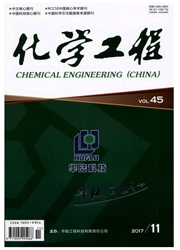

 中文摘要:
中文摘要:
采用一株具有较高硫酸盐还原活性的路德维希肠杆菌(SRB-2)处理含镉溶液,测定了SRB-2在含镉溶液中的生长、硫酸盐还原活性、溶液pH及Cd^2+质量浓度等的变化,初步分析了该菌株对溶液中镉的去除效应。实验结果表明:SRB-2在含有100 mg/L Cd^2+的溶液中生长良好,且随着SRB-2的生长繁殖,溶液的pH值从7.0升高到7.4,这可能有助于Cd^2+在溶液中形成沉淀从而被去除,其硫酸盐还原率最高为62.18%;SRB-2在Cd^2+质量浓度为50mg/L和100 mg/L的溶液中分别培养15 d后,溶液中Cd^2+去除率均达到98%。SRB-2能够在含镉质量浓度较高的溶液中良好生长,且对硫酸盐和Cd^2+有较好的去除率。
 英文摘要:
英文摘要:
Cadmium wastewater was treated using an Enterobacter ludwigii( SRB-2) with high sulfate reducing activity. The growth characteristics of SRB-2,the changes of pH of cadmium wastewater,the removal rate of cadmium,and the sulfate reducing activity were detected. The data show that SRB-2 can grow well when mass concentration of Cd^2+ in the solution is 100 mg / L. The pH value of solution increases from 7. 0 to 7. 4 with the growth of SRB-2,which can help Cd^2+ form precipitation to be removed in the solution. Sulfate is reduced in the process and the rates of sulfate reduction reach to 62. 18%. When the mass concentrations of Cd^2+ in the solution are 50 mg / L and 100 mg / L,respectively,the removal efficiency of Cd^2+is above 98% in 15 d. SRB-2 can grow well in a solution containing high mass concentrations of cadmium and has a good removal rate to sulfate and Cd^2+.
 同期刊论文项目
同期刊论文项目
 同项目期刊论文
同项目期刊论文
 Enhancement of NA of a free living nitrogen-fixing bacteria by combination of Dielectric Barrier Dis
Enhancement of NA of a free living nitrogen-fixing bacteria by combination of Dielectric Barrier Dis 期刊信息
期刊信息
